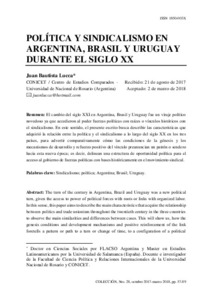Por favor, use este identificador para citar o enlazar este ítem:
https://repositorio.uca.edu.ar/handle/123456789/7107| Campo DC | Valor | Lengua/Idioma |
|---|---|---|
| dc.contributor.author | Lucca, Juan Bautista | es |
| dc.coverage.spatial | ARGENTINA | es |
| dc.coverage.spatial | BRASIL | es |
| dc.coverage.spatial | URUGUAY | es |
| dc.date.accessioned | 2019-06-19T23:55:20Z | - |
| dc.date.available | 2019-06-19T23:55:20Z | - |
| dc.date.issued | 2018 | - |
| dc.identifier.citation | Lucca, J. B. Política y sindicalismo en Argentina, Brasil y Uruguay durante el siglo XX [en linea]. Colección. 2018, 23(28). Disponible en: https://repositorio.uca.edu.ar/handle/123456789/7107 | es |
| dc.identifier.issn | 1850-003X (en línea) | - |
| dc.identifier.issn | 0328-7998 (impreso) | - |
| dc.identifier.uri | https://repositorio.uca.edu.ar/handle/123456789/7107 | - |
| dc.description.abstract | Resumen: El cambio del siglo XXI en Argentina, Brasil y Uruguay fue un viraje político novedoso ya que accedieron al poder fuerzas políticas con raíces o vínculos históricos con el sindicalismo. En este sentido, el presente escrito busca describir las características que adquirió la relación entre la política y el sindicalismo a lo largo del siglo XX en los tres países, para advertir comparativamente cómo las condiciones de la génesis y los mecanismos de desarrollo y refuerzo positivo del vínculo preanuncian un patrón o sendero hacia esta nueva época; es decir, delinean una estructura de oportunidad política para el acceso al gobierno de fuerzas políticas con bases históricamente en el movimiento sindical. | es |
| dc.description.abstract | Abstract: Abstract: The Lectio brevis made at the beginning of the Academic year in the Faculty of Law (UCA) analyzes, following the decision in “Castillo c/ Ministerio de Educación de Salta”, of the Supreme Court of December 12, 2017, two legal-political phenomena of the last decades in the precedent scope of the Superior Courts: on the one hand, via the model of neoconstitutionalism, the judges have taken the task of redefining the current law, departing especially from the literality of the legal text, under paradigms, principles and ideas somewhat alien to the just, to the reality of the legal. On the other hand, this modality has also served to secularize education, even under Constitutions that do not ignore the religious, applying the topic of neutrality. However, when the State does not allow the freedom of parents who want their children to receive religious education at school, it departs precisely from that supposedly proclaimed neutrality.opportunity structure for access to the government of political forces with bases in the labor movement historically. | es |
| dc.format | application/pdf | es |
| dc.language.iso | spa | es |
| dc.publisher | Pontificia Universidad Católica Argentina. Facultad de Ciencias Sociales. Departamente de Ciencias Políticas y Relaciones Internacionales | es |
| dc.rights | Acceso Abierto | es |
| dc.rights.uri | https://creativecommons.org/licenses/by-nc-sa/4.0/ | es |
| dc.source | Colección. 2018, 23(28) | es |
| dc.subject | POLITICA | es |
| dc.subject | SINDICALISMO | es |
| dc.title | Política y sindicalismo en Argentina, Brasil y Uruguay durante el siglo XX | es |
| dc.type | Artículo | es |
| uca.path | Colección|2018 Año XXIII nº 28 | es |
| uca.disciplina | CIENCIA POLITICA | es |
| uca.filename | /home/data-uca-generic/folder_revistas/Revistas varias/coleccion/coleccion28/politica-sindicalismo-argentina-brasil/metadata.xml | es |
| uca.issnrd | 1 | es |
| uca.affiliation | Fil: Lucca, Juan Bautista. Consejo Nacional de Investigaciones Científicas y Técnicas; Argentina | es |
| uca.affiliation | Fil: Lucca, Juan Bautista. Universidad de Nacional de Rosario. Centro de Estudios Comparados; Argentina | es |
| uca.orden | 03 | es |
| uca.version | publishedVersion | es |
| item.fulltext | With Fulltext | - |
| item.languageiso639-1 | es | - |
| item.grantfulltext | open | - |
| Aparece en las colecciones: | COL - 2018 Año XXIII nro. 28 | |
Ficheros en este ítem:
| Fichero | Descripción | Tamaño | Formato | |
|---|---|---|---|---|
| 1033-3497-1-PB.pdf | 203,02 kB | Adobe PDF |  Visualizar/Abrir |
Visualizaciones de página(s)
88
comprobado en 30-abr-2024
Descarga(s)
79
comprobado en 30-abr-2024
Google ScholarTM
Ver en Google Scholar
Este ítem está sujeto a una Licencia Creative Commons

